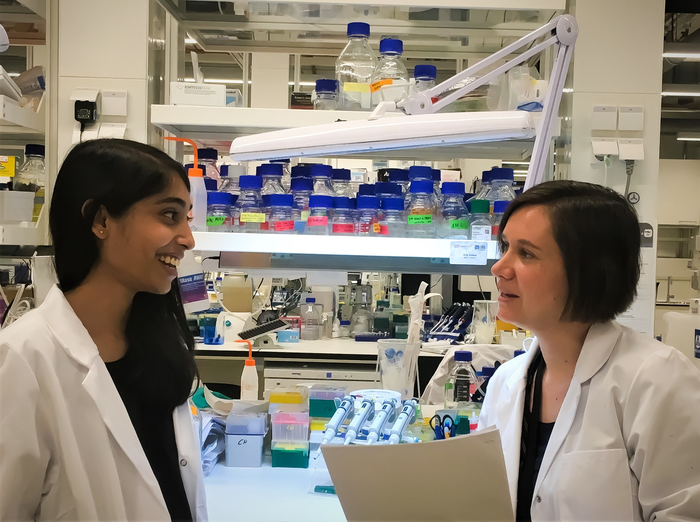Charcot-Marie-Tooth disease (CMT) is a rare hereditary condition. It occurs when genetic changes disrupt the transmission of nerve signals from the brain to the muscles of the extremities, particularly those of the lower limbs. This leads to a gradual loss of muscle tissue in the lower legs. Early symptoms of the disease, which include pain and difficulties walking, usually appear in childhood and adolescence. In Germany alone there are an estimated 30,000 people living with CMT.

Credit: Chekulaeva Lab, MDC
Charcot-Marie-Tooth disease (CMT) is a rare hereditary condition. It occurs when genetic changes disrupt the transmission of nerve signals from the brain to the muscles of the extremities, particularly those of the lower limbs. This leads to a gradual loss of muscle tissue in the lower legs. Early symptoms of the disease, which include pain and difficulties walking, usually appear in childhood and adolescence. In Germany alone there are an estimated 30,000 people living with CMT.
Enzymes become altered
“We have known for some time that mutations in genes encoding enzymes called aminoacyl-tRNA synthetases (aaRSs) can cause CMT,” explains Dr. Marina Chekulaeva, head of the Non-coding RNAs and Mechanisms of Cytoplasmic Gene Regulation Lab at the Berlin Institute for Medical Systems Biology (BIMSB), which is part of the Berlin-based Max Delbrück Center for Molecular Medicine in the Helmholtz Association (MDC).
These enzymes are required for cellular protein production, which takes place in ribosomes, the cell’s protein factories. Their job involves aminoacylation binding an amino acid to another molecule, a so-called tRNA. This enables the individual amino acids to be linked together at the ribosomes to form a protein chain according to the genetic blueprint stored in the DNA.
Translation is impaired by mutations
“The paradox is that these mutations do not disrupt aminoacylation activity, but they do interfere with translation – the production of proteins at the ribosomes,” says Chekulaeva. “To understand this mechanism, my team and I took a close look at how mutations in glycyl-tRNA synthetase affect translation processes.” This enzyme is altered in patients with a common form of CMT disease known as CMT type 2D (CMT2D).
For their work, the researchers used ribosome profiling to evaluate ribosomal activity in detail. “This technique helps us determine things like the exact codon where protein production is halted, and quantify the frequency at which this occurs,” explains Samantha Mendonsa, the study’s first author and a doctoral student in Chekulaeva’s lab.
Protein chains are too short
“We found that the gene alteration in CMT patients initially results in a shortage of glycyl-tRNA available for translation,” says Mendonsa. “This causes ribosomes to stall their protein production at the sites where the amino acid glycine is to be added to the growing protein chain.” Elongation or lengthening of the protein chain is thus halted. “The pause in elongation at the glycine sites also induces an integrated stress response, leading to a disruption of translation initiation,” she reports. Protein production is reduced as a result.
Mendonsa and Chekulaeva are convinced that their findings can provide new avenues for therapies against CMT, for which there is currently no causal treatment. “One possibility would be the administration of tRNA to overcome its shortage in the nerve cells, thus alleviating ribosome pausing,” says Chekulaeva. “Another approach could be to use relevant therapeutic agents to suppress the integrated stress response.” Yet she says pursuing these avenues further is now a task for clinical researchers.
Open questions
“Our team is now interested, for example, in the still unanswered question of how and why ribosome pausing impairs the function of the motor and sensory nerve fibers that connect the brain and lower limbs,” Chekulaeva says. An answer to that question will likely be of great benefit to people with CMT.
Max Delbrück Center for Molecular Medicine in the Helmholtz Association (MDC)
The Max Delbrück Center for Molecular Medicine in the Helmholtz Association (MDC) is one of the world’s leading biomedical research institutions. Max Delbrück, a Berlin native, was a Nobel laureate and one of the founders of molecular biology. At the MDC’s locations in Berlin-Buch and Mitte, researchers from some 60 countries analyze the human system – investigating the biological foundations of life from its most elementary building blocks to systems-wide mechanisms. By understanding what regulates or disrupts the dynamic equilibrium in a cell, an organ, or the entire body, we can prevent diseases, diagnose them earlier, and stop their progression with tailored therapies. Patients should benefit as soon as possible from basic research discoveries. The MDC therefore supports spin-off creation and participates in collaborative networks. It works in close partnership with Charité – Universitätsmedizin Berlin in the jointly run Experimental and Clinical Research Center (ECRC ), the Berlin Institute of Health (BIH) at Charité, and the German Center for Cardiovascular Research (DZHK). Founded in 1992, the MDC today employs 1,600 people and is funded 90 percent by the German federal government and 10 percent by the State of Berlin.
Journal
Nucleic Acids Research
DOI
https://doi.org/10.1093/nar/gkab730
Method of Research
Imaging analysis
Subject of Research
Human tissue samples
Article Title
Charcot-Marie-Tooth mutation in glycyl-tRNA synthetase stalls ribosomes in a pre-accommodation state and activates integrated stress response
Article Publication Date
17-Aug-2021




